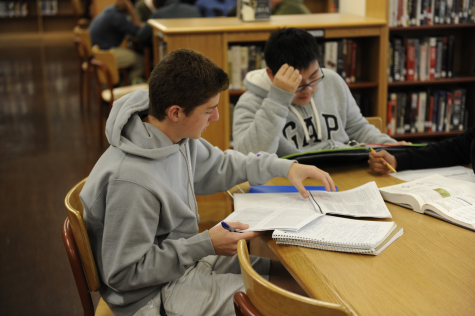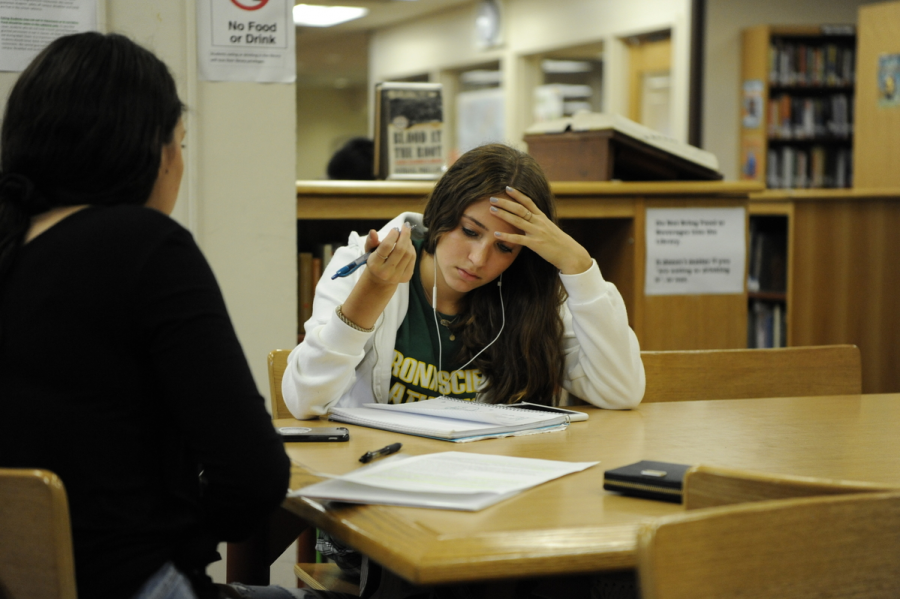Healthy Stress
Ellie Selden ’21 focuses intently on her work in the library.
Stress, an all-too-familiar word, is certainly on the minds of many students here at Bronx Science. As they attempt to balance a multitude of academic tasks, students feel pressured to also keep up with the educational standards in the school system. In spite of the stress, and maybe even because of it, students seem to prosper academically. In fact, the conventional knowledge that stress is harmful is now being challenged with the notion that it might actually be beneficial if viewed in a positive light. Altering our perspective of stress to be more favorable may lead to a healthy appreciation of it and personal growth in the long term.
According to Jeremy P. Jamieson, Associate Professor of Psychology at the University of Rochester, stress is inevitable. However, while students cannot avoid stress, they can cultivate it and embrace challenges in the process. For many, going out of one’s comfort zone can be a terrifying step to take, but it is really just a part of life.
Studies conducted by the University of Rochester and the Cuyahoga Community College have shown that students who adopt a “stress-is-enhancing” perspective have been shown to perform better when under pressure than those with a “stress-is-harmful perspective.” Those who perceive stress as a threat and something to be avoided have a negative stress mindset. Those who perceive stress as an opportunity to master a new skill or a motivator for better performance have a positive stress mindset. Participants who believed signs of stress like rapid heart beat, would better prepare them released higher levels of a stress-buffering hormone and had a better cardiovascular response than those who believed otherwise.

Joshua Kutler ’21 (left) and Winson Chen ’21 (right) concentrate on their studies in the library.
“It’s stress that allows us to be human,” said David Song ’19. “Stress makes us nervous and scared for the events that occurred or will occur. But at the same time, it prepares us to face these events.”
Ultimately, if students are feeling challenged and are advancing up levels, then they are on the right track. Progressively learning, students are moving forward as they should. By challenging themselves with academic exercises, students become more intelligent, while at the same time learning to cultivate their difficulties into positive stress. “There was one time when I had both a Statistics and a Calculus finals with both projects due on that same Friday. It was a lot to deal with, but I kept reminding myself of the greater good that came out of that experience. I persisted that entire night by using the stress as energy to stay awake and sharp. Even to this day, I remind myself that the stress I face is normal, and it will be over as long as you power through it,” said Stanley Zhu ’19.
However, adopting a positive view of stress is sometimes not sufficient, particularly when students are not given the time to recover. Students need breaks every now and then to refresh and wind down. This is especially apparent when students face heavy academic demands.
“It’s stress that allows us to be human,” said David Song ’19. “Stress makes us nervous and scared for the events that occurred or will occur. But at the same time, it prepares us to face these events.”
Many students do not consider how necessary having a break during the arduous school day is. When stress builds up, it can lead to breakdowns, feelings of negativity, or a worsening mood. It is vital that good stress does not turn into bad stress, and that as students, we do not push aside our mental health, but learn to foster it and move forward.
Abigail Yoo is a Senior Staff Reporter and a Online Newspaper Editor for the ‘Science Survey’ as well as a Groups Section Editor for ‘The Observatory.’...
Ben Wade is the Chief Photographer and Photo Editor for both ‘The Science Survey’ and ‘The Observatory’ yearbook. He takes photos of students and...
Jackson Trauben is a Photo Editor and Chief Photographer for ‘The Observatory.’ An avid reader and artist, Jackson loves using photography as a lens...

